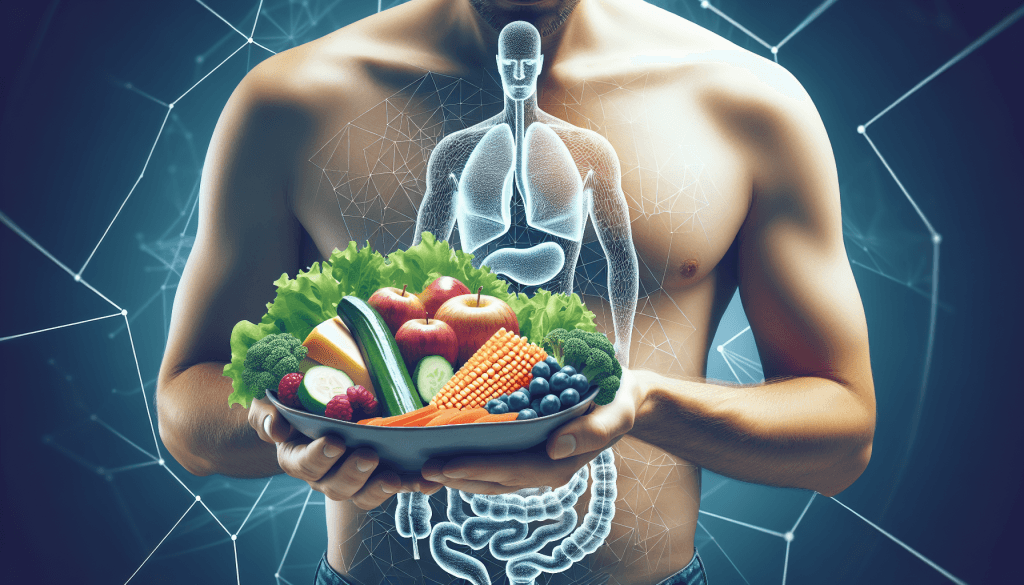What Is The Impact Of Mindful Eating On Digestive Health?
Ever feel like your stomach is trying to send you an SOS after a rushed meal? That’s where mindful eating steps in, offering a way to not only calm your gut but also improve your overall digestion. By paying attention to what, how, and why you eat, you can transform your relationship with food—and your digestive health will thank you for it. Stick around, and we’ll dive into how this simple practice can make a world of difference for your belly and beyond.
Key Takeaways
- Mindful eating involves being fully present during meals, focusing on the taste, texture, and experience of eating.
- It can improve digestion by enhancing nutrient absorption and reducing discomfort.
- The gut-brain connection plays a huge role in how stress and mindfulness affect your digestive system.
- Practicing mindful eating can help prevent digestive issues and promote long-term gut health.
Introduction to Mindful Eating
Definition of Mindful Eating
Mindful eating is all about slowing down and tuning in to your food. It’s like hitting the pause button on life to truly savor each bite. Instead of scarfing down a sandwich while scrolling through your phone, you focus on the flavors, textures, and even the sounds of your meal.
It’s not a diet or a set of rules—it’s a way to reconnect with your body’s natural hunger and fullness cues. Think of it as meditation, but with food.
Importance of Mindful Eating for Overall Health
When you eat mindfully, you’re not just feeding your body; you’re nurturing your mind too. This practice can help you make healthier food choices, reduce overeating, and even foster a more positive relationship with food.
Mindful eating is also a form of self-care. It encourages you to slow down and appreciate the moment, which can have ripple effects on your mental and physical well-being. If you’re curious about how mindful eating ties into self-care, check out this guide on mindful eating as self-care.
Connection Between Mindful Eating and Digestive Health
Here’s the kicker: mindful eating doesn’t just benefit your mind—it’s a game-changer for your gut too. When you eat slowly and chew thoroughly, your digestive system gets a head start on breaking down food.
Plus, being present during meals can reduce stress, which is a major culprit behind digestive issues like bloating and indigestion.

How Mindful Eating Enhances Digestion
Awareness of Food Choices and Eating Habits
Promoting Better Food Selection
When you’re mindful, you’re more likely to choose foods that nourish your body. Instead of grabbing the nearest bag of chips, you might opt for a colorful salad or a hearty bowl of soup.
This awareness can lead to a more balanced diet, which is essential for a healthy gut. For more on how a balanced diet impacts your health, check out this article.
Encouraging Slower, More Deliberate Eating
Ever heard the saying, “Chew your food 32 times”? While you don’t need to count, chewing thoroughly helps your stomach digest food more efficiently.
Eating slowly also gives your brain time to register fullness, reducing the risk of overeating and the dreaded food coma.
Improved Food Processing by the Body
Enhanced Nutrient Absorption
When you chew your food well, your saliva starts breaking it down before it even hits your stomach. This makes it easier for your body to absorb nutrients, giving you more bang for your bite.
Reduced Digestive Discomfort
Rushing through meals can lead to bloating, gas, and other unpleasant symptoms. Mindful eating helps you avoid these issues by giving your digestive system the time it needs to do its job.

The Gut-Brain Connection and Mindful Eating
Role of the Gut-Brain Axis in Digestion
Your gut and brain are like best friends who text each other constantly. This connection, known as the gut-brain axis, plays a huge role in digestion.
When you’re stressed, your brain sends signals to your gut that can slow down digestion or cause discomfort.
Impact of Reduced Stress on Gut Health
Lower Levels of Stress Hormones
Mindful eating can lower cortisol, the stress hormone that wreaks havoc on your gut. By staying present during meals, you create a calming environment for your digestive system.
Improved Emotional Well-Being and Digestion
Feeling relaxed and happy while eating isn’t just good for your mood—it’s good for your gut too. A positive mindset can improve how your body processes food.

Stress and Its Effects on Digestive Health
Negative Impact of Chronic Stress on Digestion
Stress is like a bully for your digestive system. It can cause everything from acid reflux to irritable bowel syndrome (IBS).
Role of Mindfulness in Mitigating Stress-Related Digestive Issues
Promoting Relaxation During Meals
Taking a few deep breaths before eating can set the tone for a stress-free meal.
Creating a Focused Eating Experience
When you’re fully present, you’re less likely to overeat or choose unhealthy foods. This can help prevent digestive issues down the line.

Techniques for Practicing Mindful Eating
Slowing Down and Savoring Each Bite
Put down your fork between bites. Notice the flavors, textures, and even the temperature of your food.
Creating a Positive Eating Environment
Eliminating Distractions During Meals
Turn off the TV, put your phone away, and focus on your plate.
Encouraging a Calm and Pleasant Atmosphere
Light a candle, play soft music, or eat outside. A peaceful setting can make meals more enjoyable and beneficial for digestion.
Recognizing Hunger and Fullness Cues
Listen to your body. Are you eating because you’re hungry or because you’re bored?

Long-Term Benefits of Mindful Eating on Digestive Health
Healthier Lifestyle Choices Through Mindfulness
Mindful eating can lead to better food choices, improved portion control, and a healthier relationship with food.
Prevention and Management of Digestive Issues
By reducing stress and promoting better digestion, mindful eating can help prevent issues like acid reflux and IBS.
Encouraging Dietary Diversity for Gut Health
A mindful approach to eating can inspire you to try new foods, which is great for your gut microbiome.
Practical Exercises for Mindful Eating
The Raisin Meditation Exercise
This classic exercise involves eating a single raisin as slowly as possible, noticing every detail. It’s a great way to practice mindfulness.
Incorporating Mindfulness Into Daily Meals
Start small. Try eating one meal a day without distractions.
Planning Meals With Intention
Take a few minutes to plan your meals for the week. This can help you make healthier choices and reduce stress.

Conclusion
Recap of the Impact of Mindful Eating on Digestive Health
Mindful eating isn’t just about savoring your food—it’s about giving your digestive system the love and care it deserves. By slowing down, reducing stress, and making thoughtful food choices, you can improve your digestion and overall well-being.
Encouragement to Adopt Mindful Eating Practices
So, why not give it a try? Your gut will thank you, your mind will feel clearer, and you might even discover a newfound appreciation for your meals.
For more tips on fostering a positive relationship with food, check out this guide.
Start small, stay consistent, and watch as mindful eating transforms not just your digestion, but your entire approach to health.
(Sources: Harvard Health, Donat, Rupa Health)
FAQs About Mindful Eating and Its Impact on Digestive Health: Discover the Connection!
What is mindful eating and how does it relate to digestive health?
Mindful eating is the practice of paying full attention to the experience of eating, including the taste, texture, and sensation of food. By slowing down and focusing on your meals, you can improve digestion as your body has more time to process food efficiently and reduce digestive discomforts like bloating or indigestion.
Can mindful eating help with common digestive issues like bloating or acid reflux?
Yes, mindful eating can help alleviate symptoms of bloating and acid reflux. Eating slowly and chewing thoroughly reduces the amount of air swallowed and allows digestive enzymes to work effectively, which can minimize these issues.
How does stress impact digestion, and can mindful eating help reduce stress?
Stress can negatively affect digestion by slowing it down or causing discomfort. Mindful eating encourages a calm and focused state, which helps activate the parasympathetic nervous system, often referred to as the ‘rest and digest’ mode, improving overall digestive function.
Does mindful eating affect nutrient absorption?
Yes, mindful eating can enhance nutrient absorption. By chewing food thoroughly and eating at a slower pace, your digestive system has more time to break down food and absorb essential nutrients effectively.
Can mindful eating help with overeating and its impact on digestion?
Mindful eating helps you recognize hunger and fullness cues, preventing overeating. Overeating can strain your digestive system, leading to discomfort. By eating mindfully, you can avoid this and support better digestion.
What role does chewing play in mindful eating and digestion?
Chewing is a critical part of mindful eating. Properly chewing food breaks it down into smaller pieces, making it easier for your stomach to digest. This also stimulates saliva production, which contains enzymes that aid in digestion.
Is mindful eating suitable for individuals with chronic digestive disorders?
Yes, mindful eating can be beneficial for individuals with chronic digestive disorders like IBS or GERD. By promoting slower eating and reducing stress, it can help manage symptoms and improve overall digestive health. However, it’s always best to consult a healthcare professional for tailored advice.
How can I start practicing mindful eating to improve my digestion?
You can start by eliminating distractions during meals, eating slowly, and paying attention to the flavors and textures of your food. Take smaller bites, chew thoroughly, and listen to your body’s hunger and fullness signals.
Does mindful eating have long-term benefits for digestive health?
Absolutely! Over time, mindful eating can lead to healthier eating habits, improved digestion, and better management of weight and stress. These long-term benefits contribute to a healthier digestive system overall.
Are there any foods that pair well with mindful eating for better digestion?
Whole, unprocessed foods like fruits, vegetables, lean proteins, and whole grains are ideal for mindful eating. These foods are nutrient-dense and easier to digest when eaten slowly and attentively, enhancing the benefits of mindful eating.



